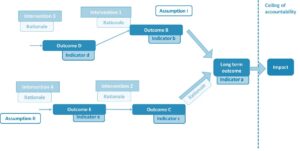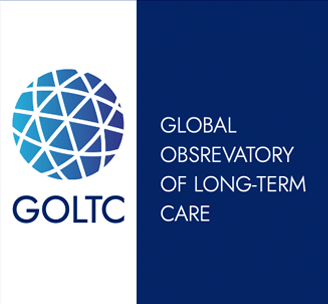Authors & affiliations
Erica Breuer (1) and Adelina Comas-Herrera (2)
(1) Consulting and Honorary Lecturer, the University of Newcastle, Australia
(2) Care Policy and Evaluation Centre, London School of Economics and Political Science, UK
Introduction
Theory of Change is an approach that seeks make explicit how an intervention, programme or policy (hereafter referred to as ‘programme’) can reach its expected impact and outcomes 1. Originally developed in the field of evaluation,2 it is increasingly being used in health and social care to develop roadmaps to understand how and why programmes will bring about change.3-7 Although Theory of Change was developed for evaluation, it is often used as a participatory planning tool before a programme is implemented to understand how and why a programme is likely to work.
A Theory of Change is usually depicted as a diagram which includes the impact of the programme and the logical pathway of the changes (outcomes) and strategies needed to reach the impact 8.
Theories of Change typically include the:
- Impact the programme is expected to have on beneficiaries;
- Short-, medium- and long-term outcomes or changes anticipated from the programme;
- Activities, interventions or strategies that constitute the programme;
- Assumptions or external conditions necessary for the programme to achieve its impact;
- Rationale or evidence base for how the activities will lead to the outcomes;
- Indicators to measure whether the intended outcomes will be achieved.

Figure 1 Schematic diagram of a Theory of Change
When to use it
Theory of Change can be used for any intervention, programme or policy where a change is expected to occur. These programmes can range from broad initiatives, such as developing national plans for dementia 9 or to more specific efforts, such as implementing advanced care planning in care homes 4. Theory of Change can draw on existing research, theory and stakeholder views.
Description
Participatory Theory of Change workshops
Using stakeholder workshops to develop Theories of Change during the programme development phase allows stakeholders to contribute to the programme design. Stakeholder engagement through participatory Theory of Change workshops ensure that programmes are working towards a common vision, fit for context and have buy-in from multiple stakeholders10.
The choice of stakeholders depends on the level and scope of the Theory of Change but should include people benefiting from the programme and their families and carers, people implementing the programme and people managing the programme. In addition, researchers, civil society organisations and funders could also be included.
For example, developing a national plan for dementia may include national level policy makers, representatives of professional associations, industry representatives and people with dementia and their carers.
Usually, an initial face-to-face Theory of Change workshop takes 1-2 days (see Figure 2 for details). This includes a welcome and overview of the problem and context and an introduction to the workshop. During the workshop, the stakeholders identify the challenges related to the problem, context and programme and then identify the impact the programme is aiming to achieve. Then the stakeholders work backwards to identify WHAT outcomes or changes need to take place to reach the impact and HOW this will happen by specifying activities or strategies. In addition, the group will outline the ceiling of accountability and the assumptions underlying the Theory of change. Where possible, we recommend that the facilitating team draw a draft Theory of Change map between the first and second days to share with stakeholders.

Figure 2 Typical outline of a Theory of Change workshop.
Following the initial Theory of Change workshops, the Theory of change is developed further. This includes operationalising activities, finalising indicators, and incorporating evidence and theory. Evidence for how strategies lead to outcomes can be drawn from existing literature such as systematic reviews and randomised controlled trials. Theory can include psychological, sociological, organisational or implementation theories which support the programme’s Theory of Change.
Relevant stakeholders can contribute to these steps via smaller working groups or give feedback on the final Theory of Change (online or in a second workshop). Ongoing input into Theory of Change process can be formalized. For example, through existing structures such as Community Advisory Boards or Lived Experience Groups.
The output from the process is usually a Theory of Change map with a narrative report of the process and the resulting Theory of Change.
Example (in long-term care)
There are several examples of the use of participatory Theory of Change in Long Term Care.
Strengthening Responses to Dementia Care in Low- and Middle-Income Countries (STRiDE)
As part of the STRiDE 9 we used participatory Theory of Change across seven countries (Brazil, India, Indonesia, Jamaica, Kenya, Mexico and South Africa) to understand 1) how to improve the lives of people living with dementia in each of the STRiDE countries; and 2) how the STRiDE project could contribute to the research evidence base and capacity building. We used Theory of Change workshops in each of the seven countries to co-create a strategic direction for dementia care and services with diverse stakeholders including researchers, policymakers, and representatives from Alzheimer’s associations. These workshops allowed for the development of a shared vision and understanding of the pathways needed to enhance dementia care and support services in each STRiDE country. This was then refined to develop an overarching cross-country Theory of Change (Theory of Change) which outlined a comprehensive roadmap towards achieving impactful outcomes in dementia care within low- and middle-income countries, as well as the role of STRiDE project. More details can be found here.
The STRiDE project illustrated how Theory of Change can be used to work with stakeholders to develop and understand the policy changes needed in dementia and long-term care. These lessons are being applied in other projects, for example, the STRiDE England project.
Supporting Inclusive development of community-based long-term CARE services through multi-stakeholder participatory approaches (InCARE)
In this project we used participatory Theory of Change to develop, adapt and contextualise social innovations for long term care in Austria, North Macedonia and Spain3. Four Theory of Change workshops were conducted—one at the project level and three in the implementation countries (Austria, North Macedonia, and Spain). These workshops aimed to identify the intended impact of the project, map out the necessary outcomes and activities, articulate key assumptions, and define accountability. The process allowed for the creation of a shared vision for long-term care within and across participating countries.
The workshops brought together diverse stakeholders (including policymakers, care users, providers, and InCARE team members) to collectively develop a Theory of Change map in each setting, defining impacts and outcomes specific to each context. For instance, in Austria, the workshop facilitated a shift in the approach of a pilot project by integrating existing local services, while in North Macedonia, it influenced the integration of an emergency button service within the social protection framework. In Spain, the workshop guided the development of long-term care policy changes over a decade, as well as refining an intervention to support unpaid carers.
Overall, the InCARE experience demonstrates the value of Theory of Change in inclusive decision-making, project design, and policy development within the care sector, supporting a more participatory and responsive approach to addressing complex challenges in long-term care.
Using Advanced Care Planning in Nursing Homes
Gilissen and colleagues 4 used participatory Theory of Change workshops together with contextual analysis and a systematic review to develop a context specific Advanced Care Planning intervention for nursing homes in Flanders. The resulting Theory of Change outlines the impacts and outcomes expected of Advanced Care Planning and the interventions need to achieve this. This intervention was tested in a cluster randomised controlled trial 11.
Discussion
Theory of Change, particularly when developed in stakeholder workshops, is a useful tool in the planning and evaluation of programmes in long-term care. In particular, as the importance of co-production with stakeholders, especially those with lived experience, becomes increasingly important. Theory of Change provides a structured approach to work with stakeholders to understand how programmes should work to reach their impact
Guidelines, manuals and reviews
- Mental Health Innovation Network Theory of Change toolkit
- STRiDE Theory of Change Workshops: Guidance and Resources
- This Theory of Change development manual from a PROMISE project in Malawi is a detailed guide to conducting Theory of Change workshops
- Systematic review of Theory of Change in Public Health Interventions
Examples of Theory of Change in long term care
- Breuer, E., Comas-Herrera, A., Freeman, E., Albanese, E., Alladi, S., Amour, R., . . . Iveth Astudillo García, C. Beyond the project: Building a strategic theory of change to address dementia care, treatment, and support gaps across seven middle-income countries. Dementia. 2021 doi: 14713012211029105.
- Gilissen J, Pivodic L, Gastmans C, Vander Stichele R, Deliens L, Breuer E, et al. How to achieve the desired outcomes of advance care planning in nursing homes: a theory of change. BMC geriatrics. 2018;18(1):47. doi: : 10.1186/s12877-018-0723-5
- Breuer E, Kadi S, Champeix C, Garcia Á, Grbevska T, Comas-Herrera A, et al. InCARE Policy Brief No. 3: Using Theory of Change – lessons from InCARE. 2022. Available here.
References
- Vogel I. Review of the use of ‘Theory of Change’ in international development. UK: Department for International Development (DFID); 2012.
- Connell JP, Kubisch AC. Applying a Theory of Change Approach to the Evaluation of Comprehensive Community Initiatives: Progress, Prospects, and Problems. In: Fulbright-Andersen K, Kubisch A, Connell JP, editors. New Approaches to Evaluating Community Initiatives, Vol 2: Theory, Measurement, and Analysis United States of America: The Aspen Institute; 1998. p. 15-44.
- Breuer E, Kadi S, Champeix C, Garcia A, Grbevska T, Comas-Herrera A, et al. Co-developing and contextualising long-term care innovations in Europe using Theory of Change: lessons from InCARE. InCARE Policy Brief No.3. 2022.
- Gilissen J, Pivodic L, Gastmans C, Vander Stichele R, Deliens L, Breuer E, et al. How to achieve the desired outcomes of advance care planning in nursing homes: a theory of change. BMC geriatrics. 2018;18(1):47.
- Breuer E, Lee L, De Silva M, Lund C. Using theory of change to design and evaluate public health interventions: a systematic review. Implementation Science. 2016;11(1):63.
- Fuhr DC, Acarturk C, Uygun E, McGrath M, Ilkkursun Z, Kaykha S, et al. Pathways towards scaling up Problem Management Plus in Turkey: a theory of change workshop. Conflict and health. 2020;14(1).
- Asher L, Fekadu A, Hanlon C, Mideksa G, Eaton J, Patel V, et al. Development of a Community-Based Rehabilitation Intervention for People with Schizophrenia in Ethiopia. PLoS One. 2015;10(11):e0143572.
- De Silva MJ, Breuer E, Lee L, Asher L, Chowdhary N, Lund C, et al. Theory of Change: a theory-driven approach to enhance the Medical Research Council’s framework for complex interventions. Trials. 2014;15(1):267.
- Breuer E, Comas-Herrera A, Freeman E, Albanese E, Alladi S, Amour R, et al. Beyond the project: Building a strategic theory of change to address dementia care, treatment and support gaps across seven middle-income countries. Dementia. 2021:14713012211029105.
- Breuer E, De Silva MJ, Fekadu A, Luitel NP, Murhar V, Nakku J, et al. Using workshops to develop theories of change in five low and middle income countries: lessons from the programme for improving mental health care (PRIME). International Journal of Mental Health Systems. 2014;8(1):15.
- Pivodic L, Wendrich-Van Dael A, Gilissen J, De Buyser S, Deliens L, Gastmans C, et al. Effects of a theory-based advance care planning intervention for nursing homes: A cluster randomized controlled trial. Palliative Medicine. 2022;36(7):1059-71.
Suggested Citation
Breuer, E. and Comas-Herrera, A. (2024) Theory of Change. GOLTC Methods Guide series, 3. Global Observatory of Long-Term Care, Care Policy & Evaluation Centre, London School of Economics and Political Science. https://goltc.org/publications/theory-of-change

